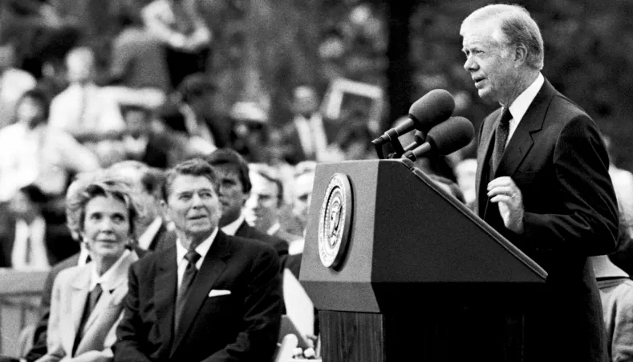Jimmy Carter waves with his signature humility and optimism, embodying a lifetime of service, decency, and unwavering commitment to the common good.
In This Article:
- How Jimmy Carter’s legacy defines decency and service
- Personal connections to Carter’s values and upbringing
- Lessons from his presidency and post-presidency
- How fear and division challenge Carter’s vision for democracy
- Can America rise to honor his inspiring leadership?
Jimmy Carter’s Human Decency: Can America Rise to the Challenge?
by Robert Jennings, InnerSelf.com
Jimmy Carter’s passing at 100 marks the end of a remarkable chapter in American history. For many, he was more than a former president—a living example of integrity, humility, and service in a world increasingly defined by division and cynicism. Carter’s life spanned a century of immense change, from the Great Depression to the digital age, yet his values remained steadfast. At a time when political discourse often prioritizes power over principle, his legacy calls us to reflect on what decency in leadership truly means.
Carter’s presidency was not without its challenges. He governed during an era of economic turmoil and global uncertainty, navigating inflation, an energy crisis, and the Iranian hostage situation. Yet, even in the face of these difficulties, Carter consistently chose the path of moral clarity. “We must adjust to changing times and still hold to unchanging principles,” he declared in his inaugural address—a sentiment that guided his efforts to champion human rights, broker peace agreements, and address systemic issues with honesty and empathy.
His life and leadership raise a pressing question: Can America embody the values Carter represented amid its current political and social upheaval? As we grapple with rising authoritarianism, widening inequality, and pervasive distrust in institutions, Carter’s legacy serves as both a challenge and an invitation. It urges us to reject the divisiveness that threatens democracy and instead embrace the principles of compassion, unity, and justice that Carter so faithfully championed.
This reflection is deeply personal for me. Growing up in North Florida and spending summers in Marietta, Georgia, I lived in a world much like the one Carter knew in Plains and Atlanta, Georgia. Our shared cultural roots were steeped in the teachings of the four Gospels, which emphasized service to others and a commitment to the common good. Carter’s decency was not merely a product of his faith; it was a reflection of his unwavering belief in the inherent dignity of all people. His example shaped my understanding of right and wrong, offering a moral compass that remains relevant today.
As we look back on Carter’s life—from his presidency to his extraordinary post-presidency—we are reminded that decency is not weakness but strength. It is the foundation upon which trust, progress, and democracy are built. The question remains: Will America rise to honor the legacy of this remarkable man, or will we let the forces of division and cynicism prevail? The answer lies in how we choose to move forward from here.
Personal Connections to Carter’s World
Growing up in North Florida and Marietta, Georgia, I often felt the deep connection of living in a world shaped by shared values and traditions. These were places where family and community intertwined, where the rhythms of life were guided by faith and the teachings of the Southern Baptist Church. Plains, Georgia, where Jimmy Carter grew up, was only a stone’s throw away culturally and literally. Its small-town charm, close-knit community, and steadfast reliance on moral principles echoed the world I knew. These shared roots made Carter’s life and legacy feel profoundly personal, as though he represented the best of what our Southern culture could offer. I even built a home for someone in Plains, Georgia, in the middle of a peanut patch.
The Southern Baptist Church was a cornerstone of that upbringing. Its teachings emphasized humility, compassion, and service, grounded in the lessons of the four Gospels. For both Carter and me, this foundation shaped our moral compass. Carter once said, “My faith demands that I do whatever I can, wherever I can, whenever I can, for as long as I can.” That unwavering belief in service to others resonated deeply with me and continues to guide my understanding of what it means to live a principled life.
However, my relationship with the church began to fray during the 1980s, as the Southern Baptist Convention became engulfed in the turmoil of the AIDS crisis. Instead of embracing those suffering from HIV/AIDS with compassion, many churches responded with judgment and exclusion. Fueled by the Reagan administration’s refusal to address the epidemic openly, these churches allowed fear and misinformation to dictate their actions. Congregations turned away the vulnerable, framing the disease as a moral failing rather than a humanitarian crisis. Watching these institutions—once rooted in the Gospel teachings of love and service—succumb to fear and condemnation was a turning point for me. It was a stark betrayal of the values I had been taught and a reminder of how easily fear can distort faith.
For Carter, whose faith was steadfast and inclusive, this must have been a deeply painful shift to witness. Although he maintained his connection to his local church, Carter formally broke with the Southern Baptist Convention in 2000, citing its increasingly conservative and exclusionary stance. His decision underscored his belief that faith should unite, not divide. Carter’s response to the church’s shift starkly contrasted the behavior I observed during the AIDS crisis, as he continued to embody the principles of compassion, humility, and justice that the Gospel demands.
In reflecting on these experiences, I see my failings more clearly. While I turned away from organized religion in frustration, Carter remained steadfast in his commitment to engage with those who disagreed. His patience and grace are qualities I often fall short of emulating. Carter’s decency challenges me, and I am humbled by the gap between his unwavering service and my struggles to live up to those ideals. Yet, his example inspires me to try, even when I fail, reminding me that decency is a choice we must make anew every day.
Carter’s Presidency: Decency Under Fire
Jimmy Carter’s presidency (1977–1981) was a test of character and resolve in an era fraught with challenges. Taking office after the disillusionment of Watergate, Carter sought to restore public trust in government by prioritizing transparency, decency, and human rights. His inaugural address reflected this commitment: “We must adjust to changing times and still hold to unchanging principles.” Yet, as history shows, governing with integrity often comes at a steep political cost.
Carter’s achievements were significant, even if not always celebrated at the time. The Camp David Accords stand as a landmark accomplishment in diplomacy. Bringing Egyptian President Anwar Sadat and Israeli Prime Minister Menachem Begin together, Carter brokered a peace agreement that ended decades of conflict and demonstrated the power of principled negotiation. This leader saw diplomacy not as a battlefield but as a bridge—a reflection of his belief in the sanctity of human life and the necessity of dialogue.
On the domestic front, Carter took bold steps to address energy conservation, recognizing the long-term importance of sustainability. In a televised speech called his “Crisis of Confidence” speech, he warned of the dangers of dependency on foreign oil and called for a collective effort to reduce energy consumption. "We are at a turning point in our history," he declared, urging Americans to embrace sacrifices for the common good. His initiatives included creating the Department of Energy and significant investments in renewable energy and policies ahead of their time but politically unpopular in a nation accustomed to abundance.
Economic challenges, particularly inflation, cast a long shadow over Carter’s presidency, creating one of the defining narratives of his time in office. These challenges were rooted in global factors beyond his control, including the OPEC oil embargo and skyrocketing energy prices. Carter addressed these issues with an ambitious economic vision, emphasizing conservation, alternative energy, and fiscal discipline. His bold decision to appoint Paul Volcker as Chairman of the Federal Reserve was emblematic of his commitment to long-term solutions, even at significant political cost. Volcker’s aggressive monetary policies eventually curbed inflation, but their painful short-term effects fell squarely on Carter’s shoulders. Despite the criticism, Carter’s economic policies laid the groundwork for the following prosperity under subsequent administrations, highlighting his focus on governance as a moral responsibility rather than a popularity contest.
The Iranian hostage crisis was perhaps the defining challenge of Carter’s presidency. When 52 Americans were taken hostage at the U.S. embassy in Tehran, Carter faced immense pressure to act decisively. Rejecting calls for reckless military action, he pursued diplomatic efforts to secure their safe return. "I will not lie to you," he said, reinforcing his commitment to honesty and measured leadership. However, the hostages were not released until moments after Ronald Reagan’s inauguration, an outcome tainted by the Reagan campaign's involvement in urging Iran to delay their release for political advantage. This manipulation undermined America and symbolized the moral decay Carter had sought to counter.

Jimmy Carter speaks with unwavering dignity and grace, exemplifying his commitment to unity and integrity—even in the face of political maneuvering that sought to undermine his presidency.
Carter’s presidency was a study in contrasts: a leader deeply committed to decency and principle navigating a political landscape that often rewarded the opposite. His actions were guided by a belief in the inherent dignity of all people and the necessity of leadership rooted in service, not self-interest. As we examine his post-presidency, we see how Carter’s unwavering integrity transcended the confines of political office, leaving a legacy that challenges us to measure leadership by its moral clarity, not political expediency.
The Post-Presidency: A Model for Leadership
Carter’s work with Habitat for Humanity became one of his most visible and enduring contributions. Hammer in hand, he joined volunteers to build homes for those in need, bringing hope and stability to families often overlooked by society. The sight of a former president working alongside ordinary citizens was a powerful testament to his humility and belief in the dignity of labor. I vividly recall seeing images of Carter, sweat pouring down his face as he swung a hammer, embodying the Gospel teaching to serve “the least of these.” Carter once said, “We can choose to alleviate suffering. We can choose to work together for peace. We can make these changes—and we must.” Habitat for Humanity exemplified this philosophy, showing how small, consistent acts of service could transform lives and inspire communities to action.
The Carter Center’s impact was equally profound. Focused on advancing peace, democracy, and global health, the organization tackled problems others ignored. One of its most remarkable achievements was the near-eradication of guinea worm disease, a debilitating parasitic illness. The Carter Center’s efforts reduced cases from millions to fewer than 15 annually—a feat accomplished through grassroots education and local partnerships. For Carter, these victories were not just statistics; they represented restored dignity and hope for forgotten communities. His quiet persistence in these efforts showed a commitment I can only aspire to achieve.
Khrushchev’s Warning and Putin’s Exploitation
During the height of the Cold War, Soviet Premier Nikita Khrushchev issued a chilling prophecy: “We will bury you.” Unlike the literal threat of nuclear annihilation often associated with that era, Khrushchev’s statement was a strategic observation about America’s vulnerabilities. He believed that internal divisions, not external force, would be America’s undoing. Decades later, this warning seems eerily prescient as the United States grapples with unprecedented polarization, amplified by foreign interference and domestic complicity.
Russian President Vladimir Putin has perfected the strategy Khrushchev alluded to, weaponizing America’s internal fractures to destabilize its democracy. Through disinformation campaigns, hacking operations, and the amplification of divisive rhetoric on social media, Russia has sown discord at every level of American society. The 2016 election interference was the most visible example of this strategy, but its effects have lingered, eroding trust in institutions and turning Americans against one another. Putin understands that a divided America is a weaker America, and he has worked tirelessly to exploit these divisions.
Putin’s success in exploiting America’s divisions owes much to domestic complicity. Partisan media, political operatives, and extremist factions have amplified his disinformation campaigns, turning subtle manipulation into full-blown narratives that polarize the nation. This amplification is often deliberate, as leaders seeking power use these narratives to consolidate their positions, even at the cost of national cohesion.
Carter’s legacy, built on decency and cooperation, starkly contrasts the prevailing suspicion and hostility culture. His belief in truth and mutual respect reminds us that democracy cannot thrive on a foundation of fear and division. The degradation of these values is a betrayal—not just of Carter’s vision but of the democratic principles he dedicated his life to protecting.
Carter’s legacy was built on the belief that democracy depends on decency, trust, and cooperation. Yet, those prioritizing power over the public good have eroded the unchanging principles of truth, fairness, and mutual respect. The degradation of these values is not only a betrayal of Carter’s vision but a direct threat to the stability of democracy itself.
For me, the echoes of Khrushchev’s warning feel deeply personal. Growing up in a world that revered integrity, I often believed that the decency Carter embodied was the cornerstone of American resilience. Seeing decency weaponized and distorted by foreign actors and domestic factions is a sobering reminder of how fragile these ideals can be. It also underscores the urgency of reclaiming them.
As we move forward, the challenge becomes clear: How do we counteract these forces and restore the values that Carter exemplified? It is not enough to recognize the threats; we must actively work to heal the divisions that have been so carefully cultivated. This is the path Carter would have chosen, and it is the one we must take if democracy is to survive.
Carter’s Lessons for Today
Jimmy Carter’s values—decency, empathy, and service—are not relics of a bygone era. They are guideposts—as relevant today as during his presidency. In a time of polarization and disillusionment, these principles remind us of the transformative power of moral leadership and our responsibility to build a more just and compassionate society.
Carter’s decency was not performative; it was rooted in action. His belief in service over self-interest defined his life, from building homes for the marginalized to eradicating diseases in forgotten corners of the world. This commitment to the common good transcended political ideology, offering a blueprint for how leadership should function.
Carter often said, and it's worth repeating here, “I have one life and one chance to make it count for something. My faith demands that I do whatever I can, wherever I can, whenever I can, for as long as I can.” These words resonate now more than ever, calling us to act in service to others and to the ideals that sustain democracy.
Today, leaders like Joe Biden and Bernie Sanders embody aspects of Carter’s legacy differently. Much like Carter’s, Biden's presidency has been marked by efforts to heal a fractured nation and restore dignity to public service. His focus on infrastructure, climate policy, and expanding access to healthcare echoes Carter’s forward-thinking approach to governance. Bernie Sanders, while Jewish, carries forward the mantle of Gospel-inspired populism, challenging systemic inequality and advocating for the rights of the underserved. Both leaders demonstrate that compassion and justice are not weaknesses but strengths that can unite a divided people.
It’s essential to distinguish Carter’s brand of populism from the divisive populism often seen today. Carter’s populism was not about exploiting fears or deepening divides; it was about lifting people, especially those left behind. His approach emphasized love, humility, and a commitment to the greater good. In contrast, modern populism often thrives on resentment and exclusion, eroding the very foundations of democracy. Carter’s life reminds us that genuine populism seeks to unify, not fracture, and to serve, not dominate.
For me, Carter’s lessons feel like a personal call to action. I see his legacy as a challenge to reject the cynicism that threatens to engulf our public life. We must reclaim the values of decency, empathy, and service—not just in our leaders but in ourselves. Democracy is not sustained by institutions alone; it is nurtured by the collective moral courage of its people.
Carter’s example offers hope, even in these challenging times. It tells us that the power to change the world lies not in grand gestures but small, consistent acts of kindness and justice. As we reflect on his life, the question is not whether we can rise to the occasion but whether we will choose to. The future of democracy depends on it.
Can America Live Up to Carter’s Legacy?
As America stands at a crossroads, Jimmy Carter’s legacy offers a powerful reminder that decency is not a relic of the past but the bedrock upon which democracy depends. His life challenges us to bridge divides with compassion, to heal wounds with justice, and to rebuild trust through collective responsibility. The path forward requires more than words; it demands action. Whether through civic engagement, volunteering with organizations like Habitat for Humanity, or fostering dialogue in our communities, we must commit to the values Carter faithfully championed. At the same time, we must remain vigilant and hold accountable those who seek to undermine democracy. The future of our shared nation depends on our ability to embody Carter’s principles in every aspect of our lives.
I often fall short of Carter’s example. I let frustration guide me more than I should. I’ve allowed cynicism to creep into my actions when patience and understanding were needed. But Carter’s life reminds me—and all of us—that decency is not about perfection. It is about striving to serve others, listen, and lead humbly. Jimmy Carter showed us that small acts of kindness and courage can create ripples of change, transforming the world around us. Now, it is our turn to carry forward his legacy of decency and service—for our democracy, our communities, and the future we all share.
Related:
About the Author
 Robert Jennings is the co-publisher of InnerSelf.com, a platform dedicated to empowering individuals and fostering a more connected, equitable world. A veteran of the U.S. Marine Corps and the U.S. Army, Robert draws on his diverse life experiences, from working in real estate and construction to building InnerSelf with his wife, Marie T. Russell, to bring a practical, grounded perspective to life’s challenges. Founded in 1996, InnerSelf.com shares insights to help people make informed, meaningful choices for themselves and the planet. More than 30 years later, InnerSelf continues to inspire clarity and empowerment.
Robert Jennings is the co-publisher of InnerSelf.com, a platform dedicated to empowering individuals and fostering a more connected, equitable world. A veteran of the U.S. Marine Corps and the U.S. Army, Robert draws on his diverse life experiences, from working in real estate and construction to building InnerSelf with his wife, Marie T. Russell, to bring a practical, grounded perspective to life’s challenges. Founded in 1996, InnerSelf.com shares insights to help people make informed, meaningful choices for themselves and the planet. More than 30 years later, InnerSelf continues to inspire clarity and empowerment.
Creative Commons 4.0
This article is licensed under a Creative Commons Attribution-Share Alike 4.0 License. Attribute the author Robert Jennings, InnerSelf.com. Link back to the article This article originally appeared on InnerSelf.com
Article Recap
Jimmy Carter’s legacy exemplifies decency, empathy, and service, guiding leadership and democracy. This article explores his presidency, post-presidency achievements, and the enduring relevance of his values. It challenges America to rise above division and carry forward Carter’s inspiring vision for unity and moral leadership.







